Related Research Articles
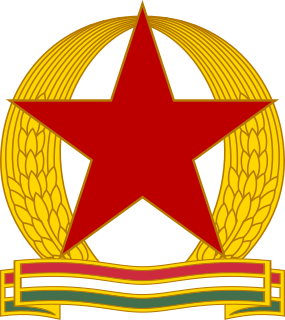
The State Protection Authority was the secret police of the People's Republic of Hungary from 1945 until 1956. It was conceived as an external appendage of the Soviet Union's secret police forces and gained an indigenous reputation for brutality during a series of purges beginning in 1948, intensifying in 1949 and ending in 1953. In 1953 Joseph Stalin died, and Imre Nagy was appointed Prime Minister of Hungary. Under Nagy's first government from 1953 to 1955, the ÁVH was gradually reined in.
Open Society Foundations (OSF), formerly the Open Society Institute, is a grantmaking network founded by business magnate George Soros. Open Society Foundations financially support civil society groups around the world, with a stated aim of advancing justice, education, public health and independent media. The group's name is inspired by Karl Popper's 1945 book The Open Society and Its Enemies.
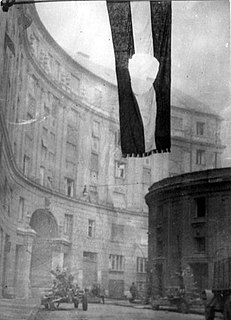
The Hungarian Revolution of 1956, was a countrywide revolution against the Stalinist government of the Hungarian People's Republic (1949–1989) and the Hungarian domestic policies imposed by the USSR. Initially anarchic, the Hungarian Uprising was the first major nationalist challenge to Soviet Union's control of Hungary since the Red Army ended the Nazi occupation of Hungary at the end of the Second World War in Europe, in May 1945.

János József Kádár, born János József Czermanik, was a Hungarian communist leader and the General Secretary of the Hungarian Socialist Workers' Party, a position he would serve in for 32 years. Declining health led to his retirement in 1988, and he would die a year later in 1989.
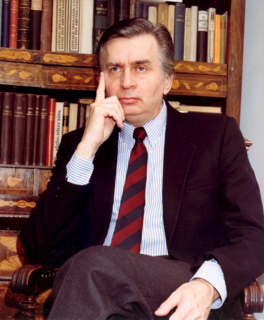
József Antall Jr. was a Hungarian teacher, librarian, historian, and statesman who served as the first democratically elected Prime Minister of Hungary, holding office from May 1990 until his death in December 1993. He was also the leader of the Hungarian Democratic Forum from 1989.
The Alliance of Free Democrats – Hungarian Liberal Party was a liberal political party in Hungary.

The Hungarian Democratic Forum was a centre-right political party in Hungary. It had a Hungarian nationalist, national-conservative, Christian-democratic ideology. The party was represented continuously in the National Assembly from the restoration of democracy in 1990 until 2010. It was dissolved on 8 April 2011.

Péter Boross is a Hungarian politician and former member of the Hungarian Democratic Forum (MDF), who served as Prime Minister of Hungary from December 1993 to July 1994. He assumed the position upon the death of his predecessor, József Antall, and held the office until his right-wing coalition was defeated in election by the Socialist Party (MSZP), which was led by his successor, Gyula Horn. Prior to his premiership, Boross functioned as Minister of Civilian Intelligence Services (1990) and Minister of the Interior (1990–1993). He was also a Member of Parliament from 1994 to 1998 and from 2006 to 2009.
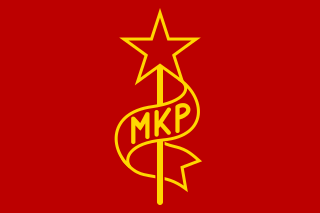
The Hungarian Communist Party, known earlier as the Party of Communists in Hungary, was a communist party in Hungary that existed during the interwar period and briefly after World War II.
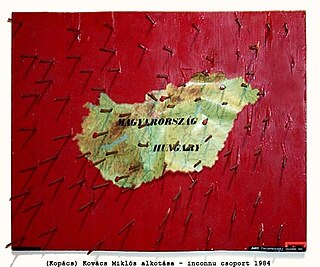
Inconnu Art Group is the name of a Hungarian group of maverick fine artists from the communist and postcommunist eras. The original members were Bokros Péter, Molnár Tamás, Csécsei Mihály, Mészáros Bánk, Letenyei József, Sipos Mihály, Kopács Kovács Miklós, and Morva Ibolya. The foundation date of the group is unknown, but as Péter Bokros remembers, they started their common activities in 1978, Cegléd, but the name "inconnu" came later.

The Hong Kong Alliance in Support of Patriotic Democratic Movements of China was a pro-democracy organisation that was established on 21 May 1989 in the then British colony of Hong Kong during the 1989 Tiananmen Square protests and massacre in Beijing. After the 4 June massacre, the organisation main goals were the rehabilitation of the democracy movement and the accountability for the massacre. The main activities the organisation held were the annual memorials and commemorations, of which the candlelight vigil in Victoria Park was the most attended, reported and discussed event each year. Due to its stance, the Central government in Beijing considers the organisation subversive.

Law enforcement in Hungary is split among the Police and Border Guards, and the Customs and Excise Authority. Since 2006, the Police has been subject to the Ministry of Justice, when the Ministry of Interior was re-structured to deal with Municipalities and Regional Development. Due to Hungary's accession to the Schengen Treaty, the Police and Border Guards were merged into a single national corps, with the Border Guards becoming Police Officers. This merger took place in January 2008. The Customs and Excise Authority remained to be subject to the Ministry of Finance.

János Kis is a Hungarian philosopher and political scientist, who served as the inaugural leader of the liberal Alliance of Free Democrats (SZDSZ) from 1990 to 1991. He is considered to be the first Leader Hungarian parliamentary opposition.

The Pan-European Picnic was a peace demonstration held on the Austrian-Hungarian border near Sopron, Hungary on 19 August 1989. The opening of the border gate between Austria and Hungary at the Pan-European Picnic set in motion a peaceful chain reaction, at the end of which there was the German reunification, the Iron Curtain fell apart and the Eastern Bloc had disintegrated. The communist governments and the Warsaw Pact subsequently dissolved, ending the Cold War. As a result, this also led to the disintegration of the Soviet Union.

Blinken Open Society Archives is an archival repository and laboratory that aims to explore new ways of assessing, contextualizing, presenting, and making use of archival documents both in a professional and a consciously activist way. It was founded by George Soros in 1995, and opened in 1996 as a department of the at the Central European University. Originally called simply Open Society Archives (OSA), in 2015 it was renamed Vera and Donald Blinken Open Society Archives after receiving a major donation from the couple.

Parliamentary elections were held in Hungary on 4 November 1945. They came at a turbulent moment in the country's history: World War II had had a devastating impact; the Soviet Union was occupying it, with the Hungarian Communist Party growing in numbers; a land reform that March had radically altered the property structure; and inflation was rampant.

The Second Hungarian Republic was a parliamentary republic briefly established after the disestablishment of the Kingdom of Hungary on 1 February 1946 and was itself dissolved on 20 August 1949. It was succeeded by the Hungarian People's Republic.
András Benkei was a Hungarian communist politician, who served as Interior Minister between 1963 and 1980.
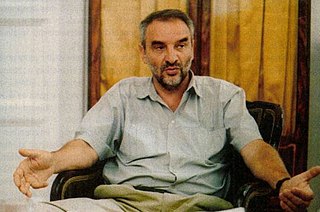
György Droppa is a Hungarian environmentalist, politician and economist, who served as leader of several extra-parliamentary green political parties since the 1990s.
Black Box was the first independent documentary videomaking group in Communist Hungary and one of the most important chronicler of the regime change in 1989. It was founded in 1987 by Judit Ember, Márta Elbert, István Jávor, András Lányi and Gábor Vági. The group distributed their documentaries on VHS tapes which were referred to as issues of a video magazine.
References
- 1 2 3 4 Graham Greenleaf; Rule, James B. (2008). Global Privacy Protection: The First Generation. Edward Elgar Publishing. pp. 174–177. ISBN 978-1-84844-063-0.
- ↑ The Dunagate Dossier, Blinken Open Society Archives
Renata Uitz: Communist Secret Services on the Screen: The Adventures of the Duna-gate Scandal in and Beyond Hungarian Media Archived 2012-03-26 at the Wayback Machine , Blinken Open Society Archives - 1 2 The History of Security Activities in Hungary Archived 2011-03-22 at the Wayback Machine , National Security Office of Hungary (NBH)
- ↑ G. Tabajdi, K. Ungvári: Elhallgatott múlt, Corvina, Budapest, 2008, pp. 100–101.
- ↑ 1990 Chronology, Cold War History Research Center at Corvinus University of Budapest